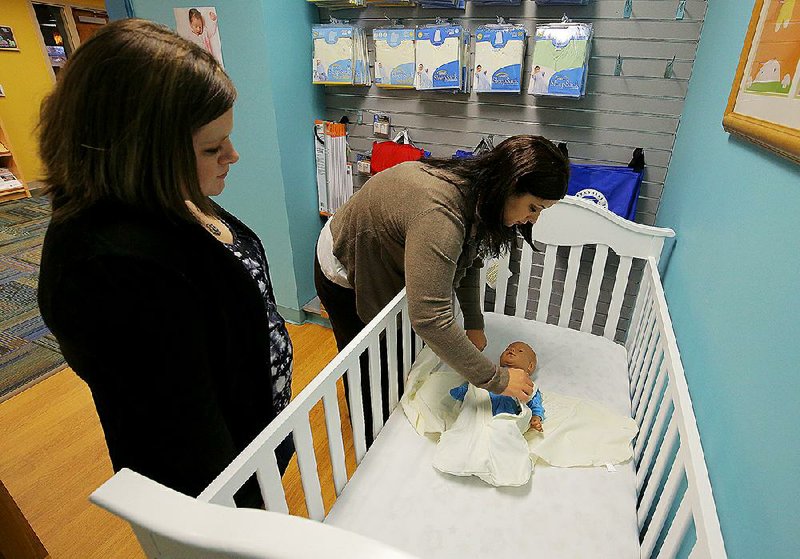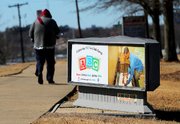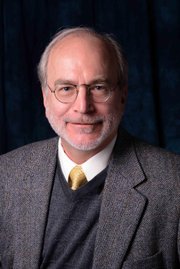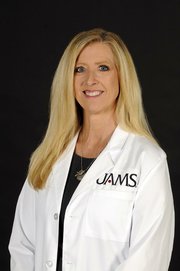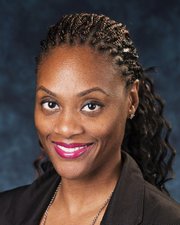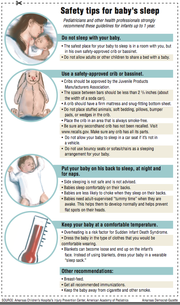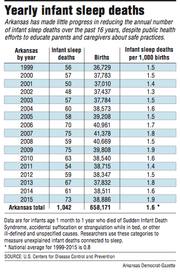Last in a series

Full coverage + online extras
Day 3:
- Stopping killer of babies takes money; how Arkansas, others try to curb sleep deaths
- How babies die sleeping: Details from a few cases
Day 2:
- Parents can face charges; unsafe sleep deaths sometimes a crime
- How babies die sleeping: Details from a few cases
Day 1:
The number of healthy infants who die in their sleep in Arkansas remains stubbornly high despite decades of efforts by public health officials.
Even with a raft of new programs since 2010 that emphasize safe-sleep practices, Arkansas still ranked second-highest in the nation when the latest federal health data on Sudden Unexplained Infant Death were released in December.
"I'm not surprised," said Brad Planey, who oversees family and infant health at the Arkansas Department of Health.
[DEAD ASLEEP: Babies at Risk » Full coverage + tips for safe sleep, interactive quiz, more]
"It's a slow process to change these things. In many ways we are talking about changing behaviors. We may have further to go than other states."
Arkansas does have more issues to overcome, said Dr. Mary Aitken, director of the Arkansas Children's Hospital Injury Prevention Center.
"Lower breast-feeding, higher smoking rates," Aitken said. "And there's a real need to continue to work with public health agencies and all kinds of groups to make sure parents get the message" that babies should sleep on their backs, alone, in safe cribs and bedding.
Success against Sudden Unexplained Infant Death, the No. 1 killer of U.S. infants between the ages of 1 month and 1 year, comes only through prevention, as scientists see it now. There is no vaccination, treatment or cure.
More than 3,000 healthy U.S. infants die from Sudden Unexplained Infant Death each year, according to the U.S. Centers for Disease Control and Prevention.
About 85 percent occur when babies sleep alongside adults, or in soft bedding or facedown in situations that can interfere with their breathing and suffocate them.
But prevention requires years of costly education for entire communities and help for poor people to get safe cribs and other safety equipment.
U.S. public health agencies, including Arkansas', have waged campaigns since 1994 to promote safe-sleeping ideas, and more recently have warned against exposing infants to smoking and overheating.
Coroner's reports reviewed by the Arkansas Democrat-Gazette show the gap that still exists between public-education campaign messages and what happens to babies in Arkansas homes.
In February 2015, a Pulaski County 4-month-old was placed on his stomach to sleep in a crib, his head on a pillow. When caregivers found him, his face was in the pillow, and he was dead.
In July 2015, an infant just 4 days old was found dead after sleeping in bed with his Pulaski County parents.
In March 2016, a Faulkner County mother said she fed her baby and placed him on his back. The 23-day-old was found dead on his stomach, facedown.
In April 2016, a Pulaski County mother wrapped her 2-month-old boy in a blanket and cuddled him to her chest. When she awoke later, he was cold and dead.
In death after death of sleeping Arkansas infants, at-risk conditions like these were standard, not the exception, a review of 102 sample cases revealed.
In 20 of the most recent sleep-related infant deaths, during 2015 and 2016, 18 of the babies died while sleeping with others in adult beds or while sleeping alone in baby beds with pillows or other unsafe bedding.
The two remaining cases didn't include enough information to determine where or how the babies slept.
'No exceptions'
Public health campaigns to change people's behaviors, whether safe sleeping, safe sex or seat-belt use, require intense focus and often millions of dollars, researchers have found.
Consider Baltimore and its "B'More for Healthy Babies campaign," which began in 2009 and is now a national model.
The city's health department wanted to reduce Baltimore's infant mortality rate, which was among the nation's highest. It decided to target unsafe sleeping, along with premature and low-weight births.
The effort started with a video called Sleep Safe: Alone, Back, Crib. No exceptions, that offered testimonials from three Baltimore parents who lost babies while bed-sharing.
Health workers and volunteers show the video individually to all mothers who give birth in the city's seven birth hospitals, and at federal nutrition sites, jails, Department of Social Services offices and jury duty rooms.
Other efforts include home visits by nurses who demonstrate safe sleeping for babies and talk about breast-feeding, stopping smoking and other infant health issues.
A barrage of media messages across Baltimore has helped.
The combined efforts cost about $15 million a year for the city of 622,000. Partners include more than 100 agencies from corporate, nonprofit, academic, donors and government, according to the health department.
The city's rate of infant sleeping deaths has declined more than 45 percent since 2010.
Arkansas has launched several safe sleeping initiatives in recent years:
• Safety Baby Showers hosted by hospitals, sororities and churches educate mothers and family members, and provide safe cribs and bedding.
• Safe sleep training for nurses and doctors at the state's 38 birthing hospitals.
• Certification applications by Arkansas hospitals to join national safe-sleep programs, such as Cribs For Kids, that distribute safe cribs and other products to families that can't afford them.
• "Text4baby," a program for expectant and new mothers that delivers free, regular text messages to their smartphones until their babies turn 1 year old. The messages cover safe sleeping, as well as fetal development, breast-feeding and other health issues. Arkansas has had more than 17,000 participants since the program started in February of 2010.
But Arkansas hasn't spent the money or had the kind of impact on public awareness that researchers have seen in Baltimore.
Safe-sleep advocates like Becky Sartini, who holds a doctorate of nursing practice and manages the Neonatal Intensive Care Unit at UAMS Medical Center in Little Rock, says everyone needs to keep looking for ways to do more.
"Safe-sleep messages have gotten so much more important now," Sartini said. "We are narrowing down more of these deaths to how the babies slept.
"I don't see why you would take a chance on these precious lives. This is real. These are Arkansas babies."
'Keep trying'
The best researchers in the world haven't identified what works best.
A wide-ranging effort to educate families, the public and medical workers seems most promising. Arkansas' safe-sleep advocates have ideas about what more should be done in this state.
Hope Mullins, a program manager with Arkansas Children's Injury Prevention Center, would like to see a safe-sleep package provided to all families before a baby is born.
It would include "sleep-sack" sleepwear that eliminates the need for baby blankets; educational materials; and a safe, portable crib if a family can't afford one.
"There's more need than resources," said injury prevention center director Aitken. "I believe if people become more aware, more resources will be forthcoming.
If a $50 portable crib will make a difference, most people will think of that as a bargain."
But buying equipment isn't enough, she said.
"We have to work with families using the products," Aitken said. "In some instances when we see these deaths, the family had the crib, but it's full of laundry."
What's also needed are one-on-one and small-group conversations and instruction, say state and national experts.
If the Health Department's Planey could, he would train more professionals in every county to talk about safe sleep. He would hire more community health workers to engage with the public.
Another need is to convince more doctors, nurses and medical professionals of the importance of safe-sleep habits, say Arkansas' public health experts.
Too often, new parents watch nurses place babies to sleep on their stomachs in maternity wards or hear doctors downplay the risks of parents and others sleeping with infants, said Aitken and others.
"We have to continue medical education from the time doctors enter medical school. We need continuing education, pediatric training, well-baby visit training," Aitken said.
Arkansas' "ABC's of Safe Sleep Campaign," run by Arkansas Children's Hospital and the state Health Department hopes to reach every county and provide educational materials to health units, hospitals and the Arkansas Women, Infants and Children Program offices.
Another campaign goal is to promote safe-sleep practices through print, billboards, public transportation displays, radio and social media.
But the campaign's $60,000 in funding runs out June 30. It isn't scheduled to renew.
Planey said the state Health Department will continue safe-sleep education through existing programs carried out by his staff and volunteers.
"Sisters United," for example, involves 42 black sorority chapters in Arkansas promoting safe-sleep practices and other infant health measures. It's drawing national attention.
Michelle Smith, director of the Health Department's office of minority health and health disparities, launched the program in 2013.
Infant sleep deaths and infant mortality rates run disproportionately high in black families. As a sorority member, she knew each group had a health initiative.
"I knew if we could focus on this together, we could maybe see some numbers go down," Smith said.
The sororities, now joined by black fraternities, are targeting premature birth, breast-feeding and infant sleep deaths.
The sororities developed a YouTube video that features black doctors promoting safe-sleep habits.
Grants of $2,000 to individual sororities have helped them hold safety baby showers, and encourage churches and historically black colleges to do the same, Smith said.
As efforts continue, and Arkansas' rate of infant sleep deaths remains among the nation's highest, Planey said he doesn't allow himself to get pessimistic.
The programs need more funding, more "feet on the ground" to spread information about safe sleeping, he said.
Meantime, "I feel we've just got to keep trying."
SundayMonday on 01/31/2017
